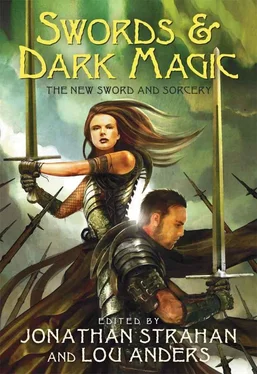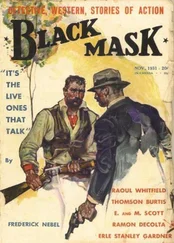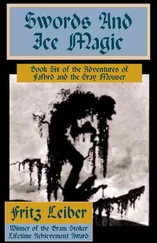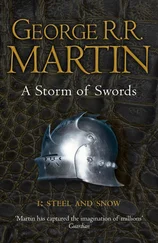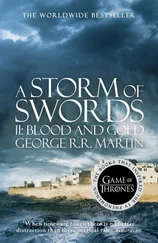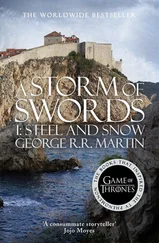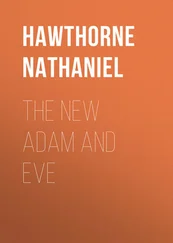The city had been put to the torch, but we returned to it. My father had been a mage of power, I knew, and I felt that his house might somehow have survived. In that I was mistaken; yet it had not been destroyed wholly. The south wing stood whole, and thus I was able to return to the very chamber I had called my own as a boy. My bed was there and waiting, and I felt an attraction to it by no means strange in a weary, wounded man. I saw to Flare as well as I could—water, a roof, and a little stale bread I found in the larder—and slept where I had slept for nights that had seemed endless so long ago. In the hills I had not dreamt; the imps and fiends that sought me out there had been those of waking. Returned to my own bed in the bedchamber that had been my own, I dreamt indeed.
In dream, my father sat before me, his head cloven to the jaw. He could not speak, but wrote upon the ground for me to read: I blessed and I cursed you, Valorius, and my blessing and my curse are the same. You will inherit.
I woke with his words ringing in through my thoughts, and I have never forgotten them. Whether they be so or no, who is to say? Perhaps I have inherited already, and know not of it. Perhaps they are as false as most dreams—false as most words, I ought to have said. For it is only those words that hold power over the thing they represent that are not false, and they are few and seldom found.
A league beyond the Gate of Exile, I saw Lurn sleeping in the shade of a spreading chestnut. Dismounting, I went to her; I cannot say why. Seeing that she slept soundly and was not liable to waken soon, I unsaddled Flare and let him graze, which he was eager to do. After that I sat near her, my back propped by the bole of the tree, and thought upon many things.
“What puzzles you so?”
Hearing her voice for the first time, I knew it was hers, deeper than my own yet a woman’s. I smiled, I hope not impudently, and said, “Gaining your friendship. I fear that you will wish to engage, and that would be but folly as the world stands today.”
“Folly indeed, for it stands not but circles the moon as both swim among stars.” She laughed like a river over stones. “As for engaging, Valorius, why, I bested you. I choose to stand upon my victory, for you might die were we to engage again.”
“You would not see me dead.”
“No,” she said; and when I did not speak, she said, “Would you see me so? You might have killed me while I slept.”
“You would have sprung up and wrested the sword from my hand.”
“Yes! Let us say that.” The river flowed again. “Let us say it, that I may be joyful.”
“You would not see me dead,” I repeated, “and you troubled to learn my name, Lurn.”
“And you mine.” She sat up.
“I have seen sun and moon in the same sky,” I told her. “They did not engage.”
“They do but rarely.” She smiled as she spoke, and there was something in her smile of the maid no man has bussed. “When they do she bests him, as is only to be expected. Bests him, and brings darkness over the earth.”
“Is that true?”
“It is. She bests him, but having bested him she bids him rise. Someday—do you credit prophesy?”
I do not, but said I did.
“Someday he will best her and, besting her, take her life. So is it written. When the evil day comes, you men will walk in blind dark from twilight to dawn and much harm come of it.”
“And what of women?”
“Women will have no warning, so that they bleed in the market. Will you come and sit by me, Valorius?”
“Gladly,” I said. I rose and did so.
“Have the Hunas killed everyone save you and me?”
“They have slain many,” I said, “but they can scarcely have slain everyone.”
“When they have looted the towns and burned them, not many will remain. Those of our people who can still hold the hilt might be rallied to resist.”
“Are they really our people?” I inquired.
“I was born among them. So were you, I think. I took shelter in this deep shade because my skin can’t bear your noonday sun. When your sun is low, I’ll walk again. Then we’ll see what a lone woman can accomplish.”
I shrugged. “Much, perhaps, with a knight to assist her. We must get you a wide hat, however, and a gown with long sleeves.”
When the sun declined, we journeyed on together, and very pleasant journeying it was, for her head was level with my own when I rode Flare. We chattered and joked, and in time—not that day, I think, but the next—I beheld something in Lurn’s eyes that I had never seen in the eyes of any woman.
That day we discovered a crone who knew the weaving of hats; she made such hat as Lurn required, a hat woven of straw, with a crown like a sugar loaf and brim wide as a shield. She sent us to a little man with a crooked back, who for a silver piece made Lurn not one long gown but three, all of coarse white cloth. Of our rallying of the people, I shall say little or nothing. We armed them with whatever could be made or found, and ere long enlisted a forester. Bradan knew the longbow, and taught some youths how to make and use war-arrows, bows, bowcases, bracers, quivers, and all such things—a great blessing.
The Hunas fight on horseback, and are quick to flee when they fear they may lose the fight. To defeat them, one lays an ambush that shall catch them as they flee. Or else one must block the point of flight; we did both at one time or another. It is not the Game, yet it is a game of the same sort. We played it well, Lurn and I.
A mountain town called Scarp was besieged, and we marched to its relief. It lay in the valley of the Bright, and while one may go up that valley, or down it, a mounted man may not leave it for many a long league. Lurn and I flipped a crown; I lost and took two hundred or so of the rabble we tried to make foot soldiers, seventeen archers, and twenty-five horsemen upstream, skirting the town by night. Ere the sun was high, we found a place where the mountains pressed in on either side and the land on both sides of the road was rough and thickly wooded. I set out sentries, stationed my horsemen a thousand paces higher to prevent desertion, ordered the rest to get some sleep, and led by example.
Flare stamped to wake me. When I sat up, I could hear, though but faintly, the sounds he had heard more clearly—our trumpets, the drums of the Hunas, and the shouts, clashing blades, and screams of war. Then I could picture Lurn as I had seen her so often, leading the half-armed men she alone made bold. She had held her attack until the sun declined. Now her wide hat and white gown had been laid aside, and she would be fighting in sandals and a loincloth as she had as a pawn, a woman who towered above every man as those men towered above children, and the target of every Hunas horse-bow.
I knew the Hunas had broken when their drums fell silent. Lurn’s trumpets shrilled orders, call after call: “Form up!” “Give way for the horse!” “Canter!” And again, “Canter!”
The Hunas had turned and fled. Our archers had the best of targets then, the riders’ backs. We wanted to capture uninjured horses almost as much as we wanted to slay Hunas. And that moment—the moment when they turned and fled—would be the best of all moments to do it. If our horsemen galloped after them, they would flee the faster, which we did not want. Besides, our horsemen would soon break up, the best mounted outdistancing the rest. Then the Hunas might rally and charge, and our best mounted would go down. We did not want that, either.
“Here they come!”
It was a sentry upon a rocky outcrop. He waved and yelled, and soon another was waving and yelling, too. I formed up my men, halberds in front and pikes behind the halberds. Archers on the flanks, half-protected by trees and stones.
Читать дальше
